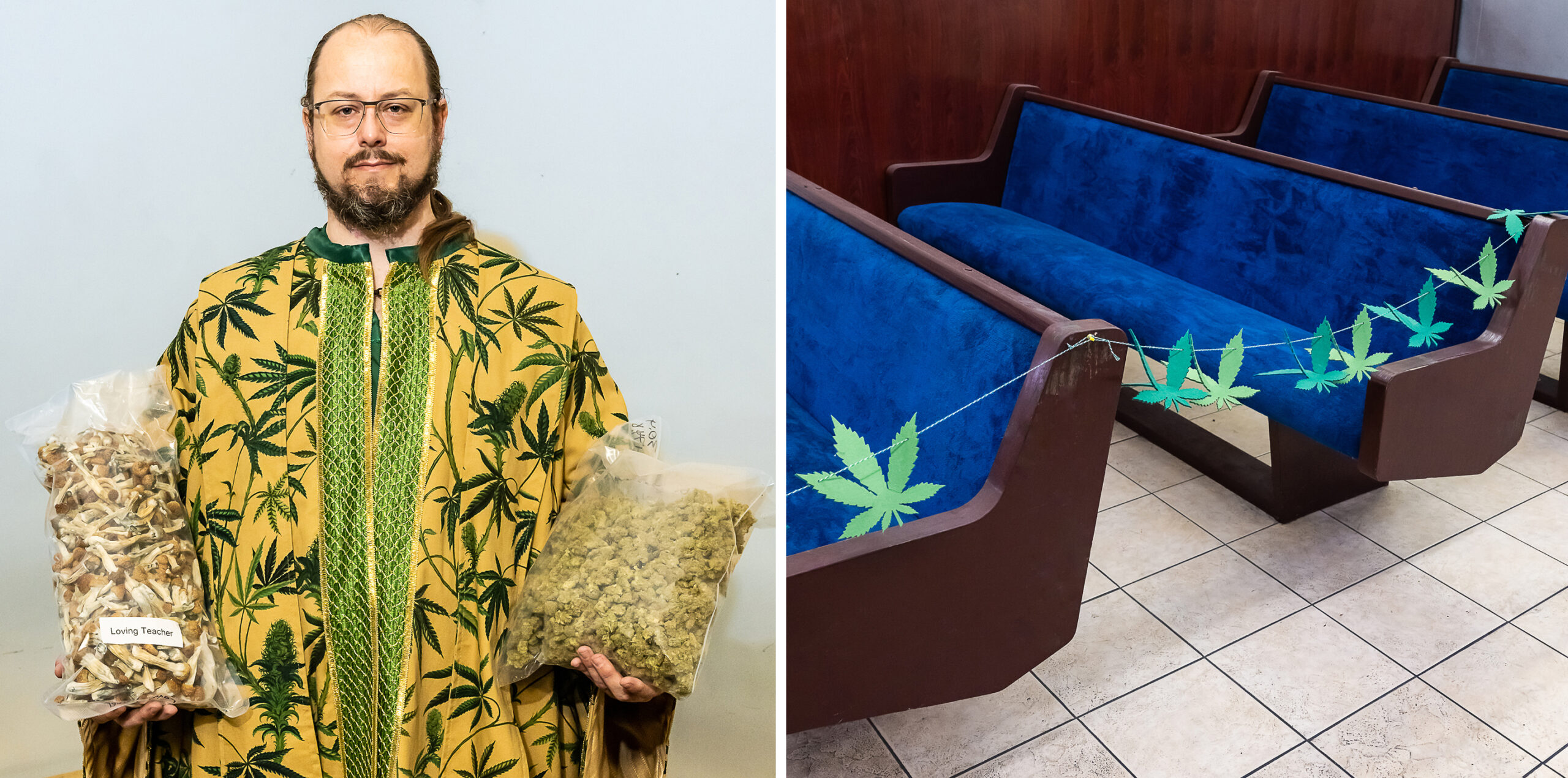Three years after his house of worship was famously raided by the Oakland Police Department, Dave Hodges of Zide Door Church has opened a satellite outpost in San Francisco’s SoMa neighborhood, a repurposed industrial building on Howard Street that’s filled with art and buzzing with helpful volunteers.
On Saturday, volunteers welcomed some of the church’s 80,000 registered members, each of whom pay $5 per month, to pick up their “sacrament” on the second floor. That holy substance isn’t blessed wine or a communion wafer, but naturally occurring, psychoactive substances—cannabis and the so-called entheogen popularly known as magic mushrooms, whose supervised use constitutes the theological heart of the faith, known as the nondenominational Church of Ambrosia.
Zide Door’s SoMa location isn’t set up to register new members just yet; at present, it’s essentially a convenient place for existing members who live in San Francisco to avoid a trek to Lake Merritt. But it is capitalizing on a wave of interest following a major medical reappraisal of psychedelics, which San Francisco largely decriminalized in 2022. Only one week before, Hodges—wearing his marijuana leaf-bedecked clerical robe and matching hat—had delivered the keynote address at Spirituality and Beyond 3, a conference on psychedelics that drew hundreds of attendees to the Midway, a Dogpatch venue better known for techno shows and multiday raves.
Pastor Dave roused the audience with a passionate defense of responsible, intentional mushroom trips, or the “high-dose space,” as a path for one’s spiritual development, capable of healing psychological trauma and bringing people closer to the divine.
These experiences aren’t akin to nibbling on a cap and a stem of dried mushroom and giggling with friends. They require planning and care and, for some practitioners, may yield life-changing results.“I never imagined myself being the head of what’s technically one of the largest megachurches in the country,” he said at the Midway. “But if you want to do what I do, you have to be prepared to go to federal prison.”
After the 2020 raid—for which Hodges and the church are suing Oakland Police Department for violating their religious freedom—Zide Door’s membership tripled. Success brought new problems, as success often does. Pre-Covid, Hodges would routinely expound on the benefits of entheogens in sermons every Sunday at 4:20 p.m., and now the church is looking for a space that can safely accommodate 1,000 or more people at a time—possibly, as one audience member at the conference suggested, in the high desert, Burning Man-adjacent town of Gerlach, Nevada.
Founded in 2019, Zide Door’s church’s somewhat-obscure sounding name came from a devotee’s mishearing of the phrase “side door,” but it’s also a reference to Measure Z, and Oakland ballot proposal from 2004 that reduced the possession of psychedelic substances to the level of lowest priority for law enforcement.
It took 18 years for San Francisco to follow suit, and Hodges isn’t actively engaging City Hall or looking to make his church’s presence felt.
“We do what we need to do,” he simply said.
Apart from his robes, Hodges doesn’t seem to have leaned into much pontifical pomp. A former tech guy, he was late to his church’s own grand opening because he had to fiddle with a malfunctioning VPN. Mostly, he’s looking forward to when he can expiate on psilocybin’s potential to large groups of people passing cannabis around in a ritual of communion, then linger for hours over informal Q&A sessions. Even if the Howard Street location thrives, it won’t be enough.
“I can’t even think about tomorrow, much less a year from now,” Hodges said. “So far, we don’t have a big enough space to do everything we need to do—we don’t even have a space for 1% of our members.”
Since the raid—which Hodges commemorated by turning the broken door to the church’s safe into a kind of conceptual sculpture—he’s become a father. Mushrooms continue to change his life in ways he insists he never imagined.
“They’ve done amazing things,” he said. “They’ve shown me things that have helped me understand my path further, understand what God is and what I’m here to do on this planet. Nothing big!”
While segments of the medical and scientific establishment may be re-evaluating entheogens, a less-benign fungus has crept into the popular imagination through HBO’s post-apocalyptic show, The Last of Us. Hodges not only hasn’t seen it, but he also wasn’t aware of its premise.
“There is a fungus that affects bugs. There’s one that does it to cicadas,” he said. “It replaces the reproductive system and makes males act like females so they infect more males. I think it actually makes an amphetamine, too. There’s some weird fungus out there, for sure.”
